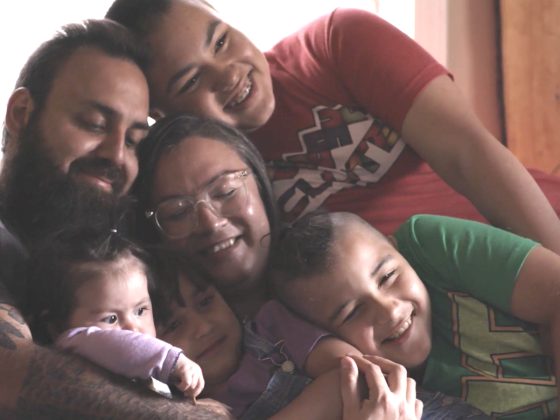
Meet The Clutes
A Native American family talks about their lives and culture.
“We are still here!” This is the powerful and forward-looking message of cultural strength and pride in this video.
Meet the Clutes, a traditional Mohawk family from the Akwesasne territory in northern New York State. Mom Kawennahente, Dad Tehanonshake, and children Iakokariio, Raniehtanawenhtha, Teiakotshatatenion, and Kaweienonni live in Mohawk territory in upstate New York, close to the Canadian border. In this video, they talk about respect, stereotypes, fairness, justice, and resilience in direct, age-appropriate, and honest ways as they celebrate their culture and community.
The Mohawk, one of the Six Nations of the Haudenosaunee (historically known as the Iroquois), have managed to keep their language and culture despite 350 years of colonization and attempted assimilation. The Clutes demonstrate how they empower their children to understand oppression and racism while keeping a high standard for how to be a good human being—as defined by their culture.
The family conversations address the diversity of Indigenous cultures in North America. They talk about stereotypes and point out that they do not fit the images seen by non-Native people. They discuss the pain of historical trauma without anger or blame, while communicating that history has shaped who Indigenous people are today. They speak of Indigenous identity and call upon their children to be proud of their heritage and accepting of those who have lost their own Native culture or language.
The conversation between mother and son explores the importance and meaning of long hair in their family and culture—which is, at its core, connectedness and identity. Many culturally-based parenting traditions (such as honestly including children in conversations about life’s challenges in clear, accessible language and not talking down to them) are demonstrated. We hear how this family teaches and expects self-regulation, respect for self and others, and for all creatures and the land itself. The Clutes use their cultural teachings to reject racism and help their children respect the diversity and to see skin colors as a beautiful manifestation of creation.
The parents build their family’s strength and a deep cultural identity from their own culture’s ceremonies, music, art, traditional medicine, and food—all part of their daily lives. Tehanonshake, the dad, works in programs that help other young people in their community connect with their traditions, too.
Think about the conversations you’ve had with your own children around culture, respect, stereotypes, and racism, and notice if there are any similarities.
As you watch, you might jot down:
- new information you hadn’t considered
- things you’d like to think or learn more about, or discuss with children or other adults
- what you might say in your own family conversations around race, ethnicity, and culture
After you watch, you might think about:
- How would such a conversation around race and culture look in your home? How would you want it to be the same or different?
- What is this family doing that you might want to do more of in your family? Is there something else you might want to do?
- Why is knowing their native language important to the Clute family?
- The family talked about what makes them proud of their family, how they are unique. How about yours?
- The family talked about ways in which they take care of themselves and each other. What does your family do to help yourselves feel strong?
By Terry Cross MSW, ACSW, LCSW and Sarah Kastelic, Ph.D., MSW, National Indian Child Welfare Association
Terry (Ha-ne-ga-noh) Cross, an enrolled member of the Seneca Nation, received his master’s degree in social work and an honorary doctorate from Portland State University in Portland, Oregon. He is the founding executive director of NICWA, now serving as senior advisor. He is the author of Positive Indian Parenting and co-authored Towards a Culturally Competent System of Care, published by Georgetown University. He has 48 years of experience in child welfare, including 10 years direct practice.
Sarah Kastelic, PhD (Alutiiq), an enrolled citizen of the Native Village of Ouzinkie, became the executive director of the National Indian Child Welfare Association (NICWA) in 2015. Prior to joining NICWA in 2011, Sarah led the National Congress of American Indians’ (NCAI) welfare reform program and, in 2003, was the founding director of NCAI’s Policy Research Center. She began her career at the Bureau of Indian Affairs central office as a child welfare specialist in 1998. She earned a master’s degree and PhD from the Brown School of Social Work at Washington University in St. Louis, where she serves as adjunct faculty. Sarah has served as principal investigator of several national federally and privately funded research projects, partnering with reservation-based and urban Indian communities. She has authored numerous publications, including journal articles, book chapters, and curricula. She serves on the board of directors of Generations United, Independent Sector, and Underscore.
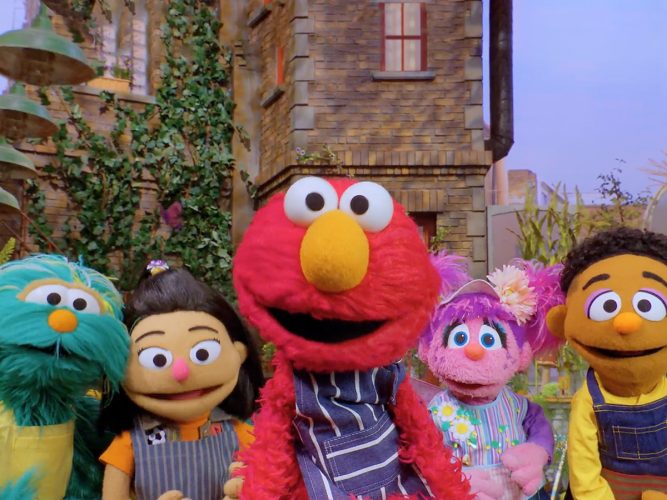
Community Song
A video about community.
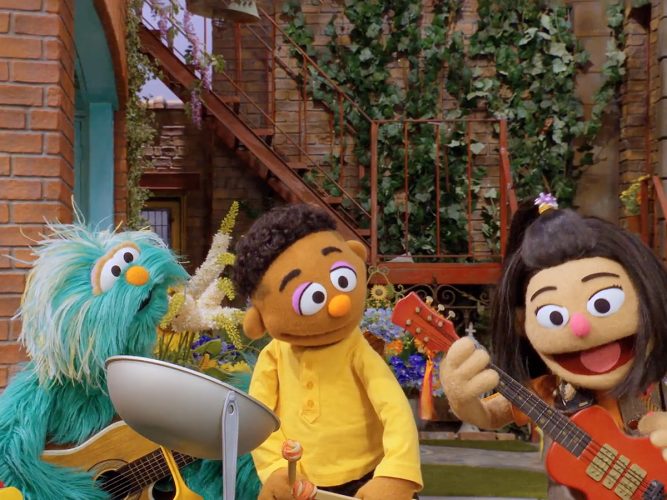
Musical Show & Share
A video about coming together to create something beautiful.
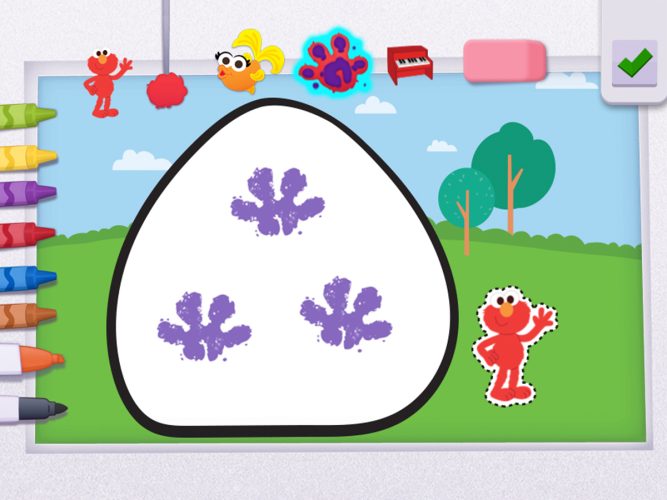
Welcome to Our Garden
An interactive game in which children add rocks to the Sesame Street community garden.
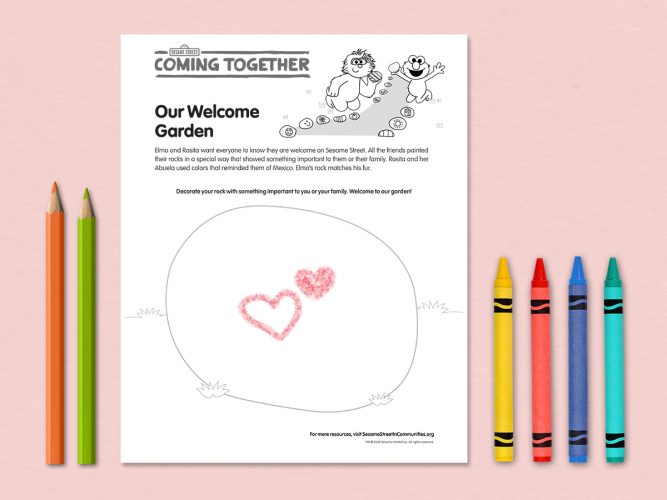
Our Welcome Garden
A printable page about a community rock garden.
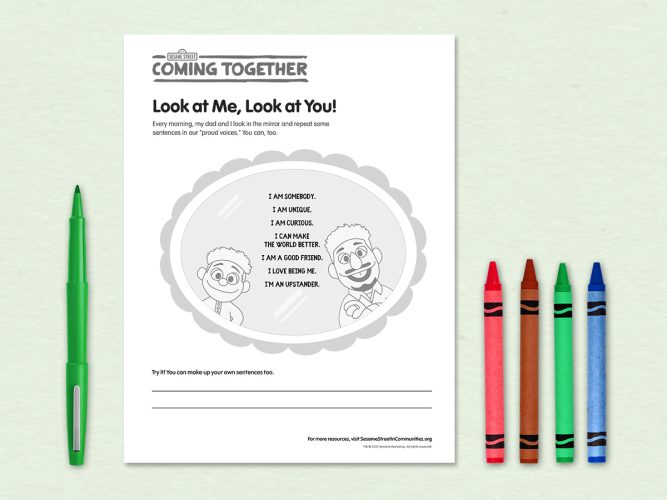
Look at Me, Look at You!
A printable page with parent-child affirmations.
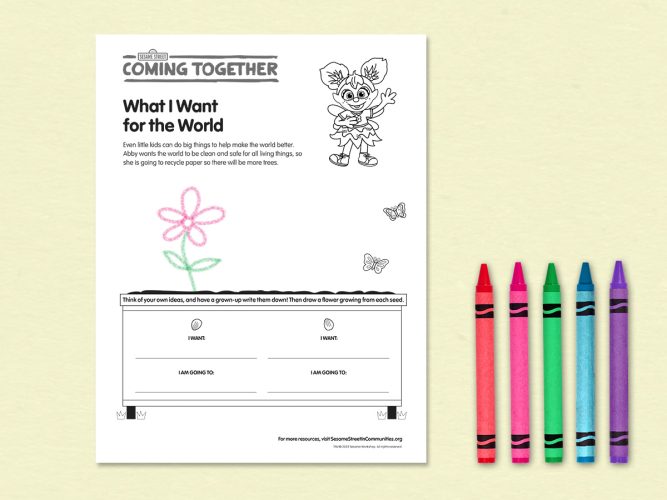
What I Want for the World
A printable page about making a difference in the world.

What We Love
A printable about how we are different and what important things we share.
